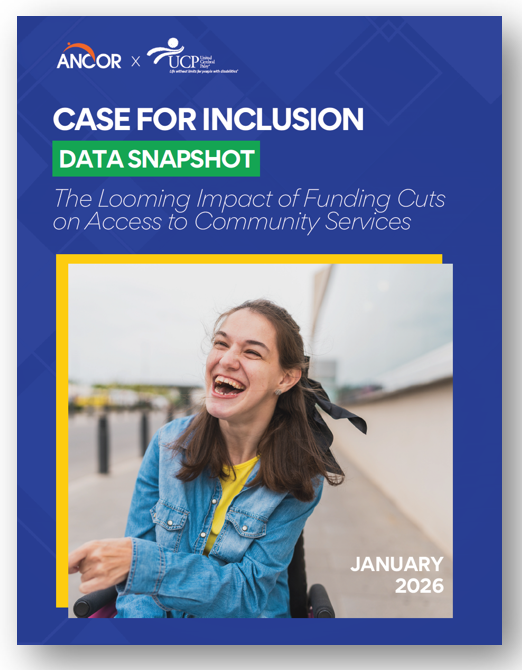About the Case for Inclusion
Since 2006, the Case for Inclusion has been a leading source for data and policy recommendations regarding the effectiveness of state Medicaid programs in serving people with intellectual and developmental disabilities (IDD) and their families. Composed of data on 80+ measures sourced from leading researchers and comprehensive policy recommendations for lawmakers at all levels of government, the Case for Inclusion gives legislators, administrators, advocates and other disability champions a sense of the scope of the challenges we face and what we can do to stem the tide of significant systemic challenges.
About Our Key Publications
The Case for Inclusion is all about drawing connections between data that illustrate key challenges and solutions that make meaningful improvements in quality of life for people with IDD.
In addition to the data and advocacy tools found on this website, the Case for Inclusion draws these connections through three different types of publications:
- Key Findings Reports: Published annually from 2006 until early 2024, these reports highlighted new data made available over the previous year, plus policy solutions to pursue in the year to come. These reports offer detailed insights about the challenges facing the IDD service delivery system, as well as recommendations for what all branches and levels of government can do to alleviate these challenges.
The final Key Findings report was published in March 2024. Subsequently, Case for Inclusion Policy Blueprints are published in the first quarter of each year to help inform advocacy during states’ legislative sessions. Then, periodically at other points in the year, Case for Inclusion Data Snapshots offer timely data analyses to help illustrate the nature of the challenges facing community-based disability service providers. - Data Snapshots: Beginning in late 2024, updated data is added to the Case for Inclusion website periodically. Select data is then featured in Case for Inclusion Data Snapshots, which are shorter, more targeted reports that offer timely insights about trends within IDD services.
- Policy Blueprints: Whereas our Data Snapshots give texture to the challenges facing people with IDD to live a life without limits in their homes and communities, Case for Inclusion Policy Blueprints outline what federal and state governments can do to move the needle on key challenges, as well as what advocates can do to bring those solutions to fruition.
About United Cerebral Palsy
For more than 75 years, United Cerebral Palsy has been an indispensable resource for people with cerebral palsy, Down syndrome, autism spectrum disorder and other neurodevelopmental disabilities. UCP has 56 affiliates that provide a wide range of services annually to more than 150,000 children and adults, including resources and referrals, advocacy, research, educational instruction, early intervention, physical therapy, job training, integrated employment, home and community-based services, recreational opportunities and housing assistance. UCP also advocates for direct support professionals (DSPs) and other direct care workers, and is committed to the idea that all people with disabilities should be treated as equal members of an inclusive society so they can "live life without limits."
About ANCOR
A leading national association of community-based providers, ANCOR has advocated relentlessly for person-centered outcomes for people with intellectual and developmental disabilities since 1970. As the trusted conduit of resources for providers, policymakers and the public, ANCOR enhances providers’ ability to support individuals with I/DD to be fully included and empowered in their communities.
Acknowledgments
UCP and ANCOR owe a debt of gratitude to the lead author of this report, Tom Rice, as well as several of our respective organizations’ team members, including Armando Contreras, Sarah Peiper, Kismet Saglam and Diane Wilush from UCP, as well as Elise Aguilar, Noah Block, Lydia Dawson, Sean Luechtefeld, Ashley Smith and Alli Strong-Martin from ANCOR.
We are deeply grateful for the contributions from the members of UCP’s Public Policy Committee, who reviewed and provided suggestions for the report.
Finally, we are immensely grateful for the expertise and creativity of several consultants and partners who contribute to the Case for Inclusion throughout the year. Special thanks to Erin Dennis, Claire Murchison and Emily Orlich from BerlinRosen for supporting communications and outreach; and to Michael Walker and Jason Melancon of Data Made Useful for developing many of the helpful tools found at caseforinclusion.org.
Contact Us
If you have questions about the Case for Inclusion, including inquiries about this website or the publications found here, please email Tom Rice.




